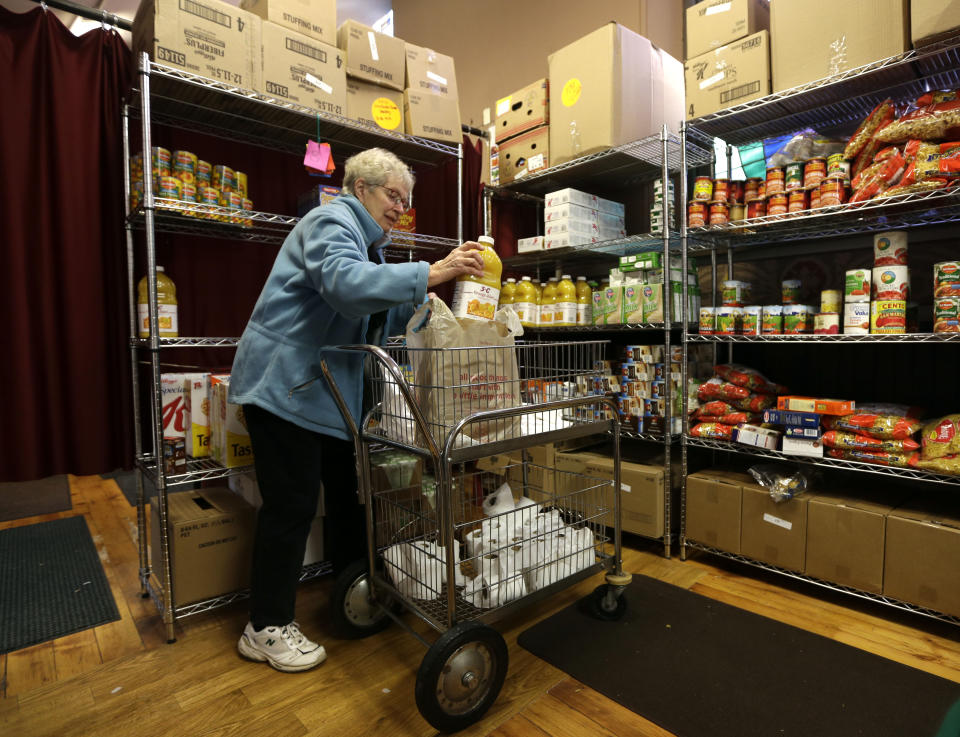Hunger advocates push for NY minimum wage increase
ALBANY, N.Y. (AP) — Advocates for the working poor on Monday urged New York's government leaders who are poised to raise their salaries in coming weeks to also raise the minimum wage and replenish food banks for victims of Superstorm Sandy.
The interfaith clergy used their annual Thanksgiving appeal for aid for hungry New Yorkers to push for the wage initiative during a march and rally held Monday in downtown Albany. They're also seeking better funding of food pantries for superstorm victims.
The Rev. Kathy Donley urged lawmakers to help health care workers who can't afford good health care, farm hands who can't afford enough food and people who clean houses who can't afford decent housing.
The Hunger Action Network said its survey found a third of the state's food pantries and soup kitchens report too little food to meet their demand and more than 6 in 10 reported cuts in government funding. Meanwhile, the number of people using food pantries increased 9 percent, and soup kitchen users increased 2 percent. About 3 million New Yorkers use the emergency food services dependent on donations and volunteers.
"We ask that you soften the hearts of our legislators and governor," prayed Sister Doreen Glynn of the Sisters of the Poor order. "Do the just, the moral thing ... so growing families might not only survive but thrive."
The groups say the minimum wage must be raised to at least $8.50 an hour, from the current $7.25 an hour, with regular, automatic increases. The wage increase proposal, which is popular in public polls, was pushed during the regular session that ended in June by Democratic Assembly Sheldon Silver. But the Senate's Republican majority opposed the measure, saying it would eliminate jobs for the working poor as the economy slowly rebounds.
The proposal has long been expected to be part of bargaining with several issues. They include a raise in legislators' basic salaries of $79,500 as well as increases in the six-figure salaries of top commissioners in Gov. Andrew Cuomo's administration. Cuomo says the raises are needed to attract top talent.
Legislative and executive chamber salaries haven't increased in more than a decade. Votes on the politically dicey raises usually come after the legislative elections and as part of a deal with a governor seeking to extract major policy wins.
Cuomo could benefit from this opportunity for some of his progressive goals including the voluntary public financing of campaigns and restrictions on the stop-and-frisk procedures of New York City police.
But November's election has made the special session more complicated. Republicans are counting on a narrow win in the 46th Senate District. The Republican, George Amedore, has slightly surpassed Democrat Ceclia Tkaczyk in the counting of paper and absentee ballots since the Nov. 6 election, but thousands more will be counted by or around Dec. 1.
If Republicans win, they will have 31-31 split with Democrats, though Democratic Sen.-elect Simcha Felder has already committed to sitting with the GOP conference, providing the Republicans a continued majority.
Even without a Republican win, the GOP majority could operate as a coalition majority working with the four breakaway members of the Independent Democratic Conference. It has allied with Republicans for two years.
Either way, a December special session sought by many legislators could still be called and a mega-deal as in past years could be quickly negotiated.


